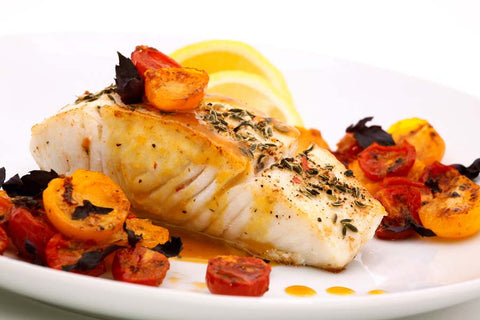Shopping for seafood and fish can get confusing when you have food restrictions, especially religious ones. People who keep kosher often deal with wrongly labeled fish, which causes mistrust in seafood handlers. Following the kosher seafood rules is crucial when offering products to Jewish customers.
At KnowSeafood, we ensure that the kosher fish we provide for our customers is certified! You can shop with us without worrying about mislabeled products.

Kosher Seafood Rules: What Does Kosher Mean?
When we refer to food as kosher, it means it conforms to the Jewish dietary law "Kashrut." The dietary regulations of Kashrut apply to food that comes from living creatures.
The Kosher dietary regulations restrict the consumption of certain types of fish, mammals, and birds. Eating the flesh of any creature not meeting the dietary law criteria is forbidden.
According to the dietary laws, the kosher food category called pareve includes foods that do not contain meat or dairy. Pareve kosher foods remain kosher if not mixed or processed with equipment used for meat or dairy products.
The pareve category of kosher foods includes the following:
- Fish
- Eggs from kosher birds
- Produce
- Grains
- Plants
However, regarding food manufacturing, there are many complexities to kosher certifications. Seafood and fish must be obtained and handled with kosher methods.
Unfortunately, many providers falsely market their products to customers observing kosher laws. This is why, with KnowSeafood, you may rest assured the kosher fish delivery box you get meets the kashrut regulations.
The Jewish dietary laws regarding seafood and fish state the following kosher rules.
Seafood
Even though fish is kosher, there are some important rules about seafood. So, why is seafood not kosher?
All sea creatures that do not have fins or scales are not kosher, even if they are scientifically classified as fish or resemble one. This means that sea creatures, like whales, sharks, shellfish, prawns, crabs, lobster, octopus, and shrimp, are prohibited.
Fish Inside a Fish
The kosher rules are a bit different regarding a fish inside a fish. For example, if you find a kosher fish inside the stomach of a non-kosher fish, according to the Kashrut, it is now kosher.
In contrast, if you find a non-kosher fish inside the stomach of a kosher fish, it is no longer considered kosher.
Fish Eggs
If the fish eggs come from a kosher fish, then they are also kosher, while eggs from non-kosher fish are not kosher. So when purchasing caviar or roe, you must ensure the eggs are certified kosher.

Fish Blood
In Jewish tradition, fish blood is considered kosher, but it is forbidden to drink it once removed from the fish as it may be confused with animal blood. An exception is if scales are present in the blood, which makes it clear it is not animal blood.
What Seafood is Kosher?
Only fish that originates from an animal with scales and fins, like mackerel, halibut, tuna, or salmon, is kosher. Having scales and fins is what makes a fish kosher. Still, some fish have scales that are not kosher, such as marlin, sailfish, paddlefish, sand lance, and sculpins.
Shrimp and other shellfish do not have fins or scales; therefore, they cannot be kosher.
Eggs from kosher fish or poultry are acceptable if there are no signs of blood present. Kosher regulations restrict the use of animal products to particular animals and meat pieces that are killed and processed in a certain way.
Kosher handling of fish
According to the Torah, permissible food handling must be done per kosher requirements. For animals and birds, this begins with kosher slaughtering, "shechita", but fish do not have this requirement.
For fish, the following steps in handling include:
- Fish do not have to be slaughtered according to shechita, as the fish is considered slaughtered as soon as it is removed from the water. But Jewish tradition forbids eating fish while it is still alive.
- When rendering a fish kosher, its scales must be visible and easily removed from the fish skin by hand or with an instrument.
- After removing the scales, you must inspect the fish's internal organs for any physiological abnormalities that may make it non-kosher "treif".

Conclusion
Following all kosher seafood rules is vital when handling products offered to Jewish customers. This means having the proper kosher certifications to ensure the customers the fish they purchase have been handled as per Jewish tradition.





